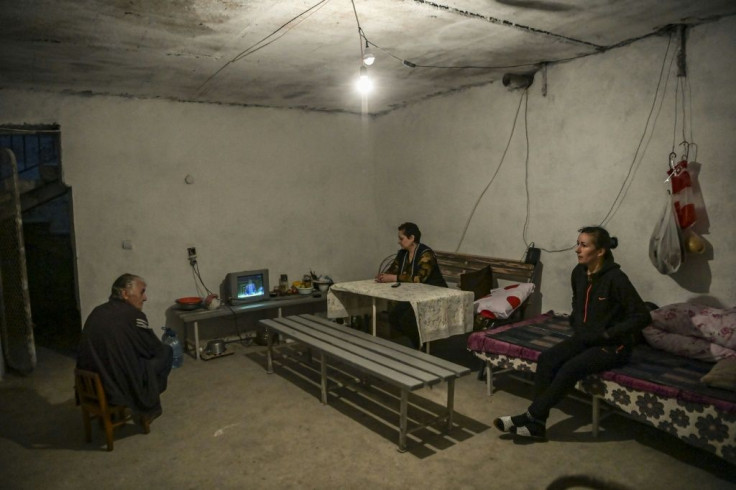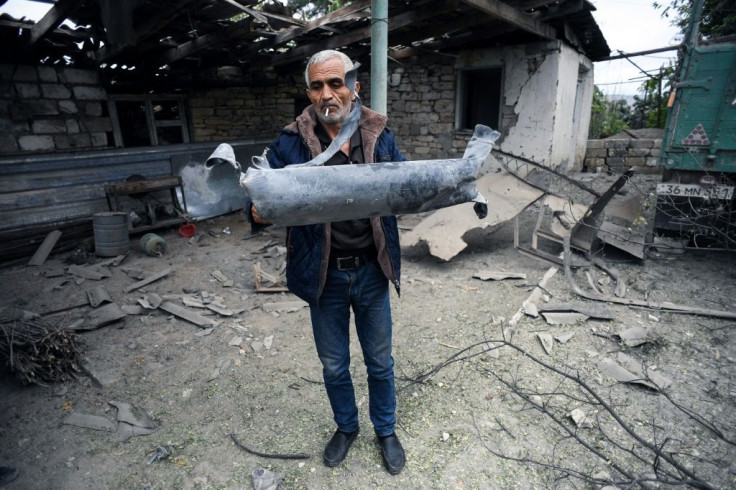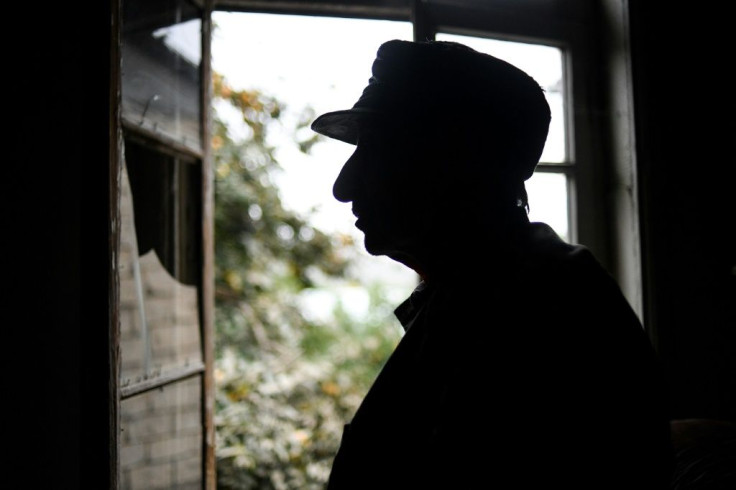Defiance Amid The Bombs In Nagorno-Karabakh
Next to a huge painted portrait of a smiling Monte Melkonyan, an Armenian "national hero" of the 1990s war against Azerbaijan, Soviet era red plastic letters spell out the town name -- Martuni.
Martuni is an unprepossessing, agricultural spot nestled in the hills -- yet with war having returned Nagorno-Karabakh finds itself a handful of kilometres (miles) from the front line of a new conflict.
In the distance the dull thud of a rocket can be heard. After a calm early morning rockets and heavy mortar fire periodically shatter the silence, the hail of steel making the ground shake.
Close to the war memorial of soldiers who gave their lives in World War II the broken windows of imposing official buildings belong to the headquarters of the local municipal authorities.

Deputy mayor Aznavur Saghyan, a man in his 30s surrounded by soldiers, greets AFP reporters from the top of a staircase leading up from a cellar serving as a shelter from air attack.
"You can check out the destruction," said Saghyan. "But be careful and keep your head down if you are in a bombed sector," he warned before heading off with a military and civilian entourage, serious-faced and with a cigarette dangling from his lips.
It was in Martuni where two French journalists working for Le Monde daily were injured on October 1 during a media visit to the town.

Since then access international media access to the front line zone has been cordoned off with reporters mostly operating out of the separatist capital Stepanakert, some 20 kilometres (12 miles) to the northwest.
In recent days the city has been the target of heavy bombardments from Azerbaijani forces.
Yet on its outskirts the bombs rain down -- so close to the frontline the tension is palpable and the few men whose path one crosses in the almost deserted Martuni are visibly exhausted.
Off the town's shimmering and treelined main drag are a few battered Ladas boasting miles on the clock back to the 1980s, just visible behind an outhouse or a wall providing protection from grape shot.
The war damage does not seem so apparent aside from broken window fragments on the ground -- but in this typical Caucasus village homes are dotted about.

Some boast brutalist Communist-era architecture although others have the charm of rural villas, topped off by grape-laden vines that cascade down to their gardens.
Yet just round the corner, near two orchards bursting with pomegranate, is a street, its asphalt ripped up, the houses just off it disembowelled in an Azeri bombardment.
"I am not afraid. I am a veteran of the 1990 war," says the owner of one dwelling which has so far survived unscathed just a stone's throw from the town hall.
"We've had all kinds of stuff falling on our heads these past few days. Grad and Smersh rockets, drones, artillery," volunteers the man, a friendly soul in his 50s from his leafy porch.
In another part of town sits a soulless, rectangular 1960s block below which are two gym workshops rusting away near sandbags.
"Don't smoke," says the sticker on the door of the entrance which leads to an impeccably laid out basement sheltering an elderly couple watching TV.
With them is a woman aged around 30 clad in a black cloak and clogs who beams as she describes herself as "one of only two female volunteers in this sector of the front.
"I do the cooking for the units deployed out on the battlefield. I came here to have a shower and a bit of a rest," she explains.
"Today's war is much worse than the one in 1990," she adds.
"In those days they fired automatic weapons at us. Today, it's bombs and artillery."
"Doesn't matter," says Svetlana Siranyan, the steely eyed wife of the old man.
"We shall win this new war."
© Copyright AFP 2024. All rights reserved.





















